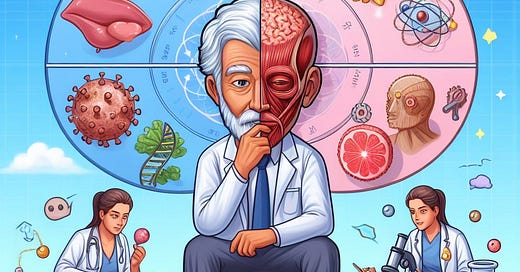In (eco)Philosophical Health, Jessica Böhme writes,
Sometimes, the most simple reframing changes how you grasp an idea. To me, philosophical health is such a term. Though skeptical of the word health, I've never heard a better description to express what I am working on. It's so simple that I think even those unfamiliar with concepts such as inner transformation, the meaning crisis or adult development can grasp what "philosophical health" means.
This lands rather well with me. What we believe matters and what we collectively believe matters. Our beliefs drive our behavior so best we live with conscious awareness of these dynamics.
So what makes a wholesome philosophy - or philosophical health?
Mental Heroism: Mental heroism refers to the courage and resilience required to navigate the complexities of modern life.
Yes, life is complex, beyond the ability of a single individual to grasp.
Deep Orientation: Deep orientation is to define a fundamental high orientation.
My deep orientation is highly agnostic. I do not know what is fundamental, perhaps nothing. This orientation helps me live with uncertainty without undue angst, without much need for a foundation.
Critical Creativity: Critical creativity means not only being able to remain logically vigilant about fallacies of reasoning by examining the premises and consequences of our beliefs– it also means to address and anticipate situations of crisis with an hyperstatic attitude…
I will need to find some simpler language so I can wrap my mind around this one.
Deep Listening: Deep listening is the practice of fully engaging with others and their perspectives with openness, empathy, and attentiveness. Deep philosophical listening induces a feedback loop of attention between the persons in dialogue.
And this is a practice that I want to get much better at.
The way I understand philosophical health requires the following:
a cosmology: a perspective about the nature of the universe, its origin, structure, and evolution.
I am comfortable not knowing what the ultimate origin of the universe is.
an ontology: a perspective of the nature of being, existence, and reality.
I am comfortable not knowing what the ultimate reality is.
an epistemology: a perspective on what knowledge is
I know that there is considerably more to know than what science gives us.
ethics: a perspective on what’s good and bad
I try to live by the the dictum do no harm.
an axiology: a perspective on what is the good life
Whatever this is, I have it, currently living the best years of my life.
an anthropology: a perspective on what it means to be human and human’s role in the universe
Amazingly, we lack an adequate model of what a human being is. I would start with start with two premises, that we are complex systems and that we are animals.
a social imaginary: a perspective about how society should be organized.
How? Very, very differently than what we have now. And organized with coherent pluralism as an objective.
and áskesis: which simply means ‘exercise’ or ‘training’ in ancient Greek.
And also means self-control and self-discipline.
To do all that, and to become philosophically healthy, we can't be left alone.




